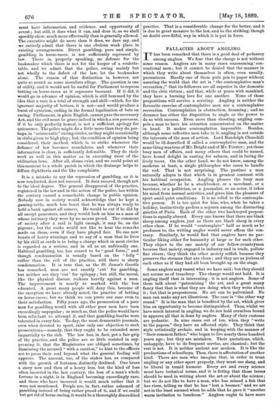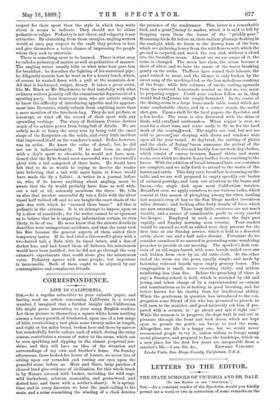FALLACIES ABOUT ANGLING.
IT has been remarked that there is a good deal of pedantry among anglers. We fear that the charge is not without some reason. Anglers are in many cases unassuming, con- ventional men ; but it cannot be denied that the manner in which they write about themselves is often, even usually, pretentious. Hardly one of them puts pen to paper without assuring the world that the art is "the contemplative man's recreation ;" that its followers are all superior in the domestic and the civic virtues ; and that, while at peace with mankind, they have a burning love for one another. None of those propositions will survive a scrutiny. Angling is neither the favourite exercise of contemplative men nor a contemplative recreation. Contemplation is abstraction, dreaming ; and no dreamer has either the disposition to angle or the power to do so with success. Even more than shooting, angling com- pels a man to have his attention concentrated on the matter in hand. It makes contemplation impossible. Besides, although some reflective men take to it, angling is not outside the interests of the man of action. Lord Randolph Churchill would be ill-described if called a contemplative man, and the same thing was true of Mr. Bright and of Mr. Forster; yet those busy men of affairs, and many others that could be named, have found delight in casting for salmon, and in luring the lively trout. On the other hand, we do not know, among the moderns at least, a single philosopher who cares to handle the rod. That is not surprising. The pastime a man naturally adopts is that which is in greatest contrast with his habitual occupation. Angling pleases the busy man because, whether he be a stockbroker, or a merchant, or a barrister, or a politician, or a journalist, or an actor, it takes his mind from normal activities, and gives him the pleasure of sport amid quiet conditions. It is no relief to the contempla- tive person. It is too quiet for him, who, when he takes a holiday, instinctively prefers a sojourn among the distracting gaieties of Paris. Each of the other two hackneyed proposi- tions is equally absurd. Every one knows that there are black sheep among anglers, just as there are black sheep in every other class. If he would " contemplate " half as much as he professes to, the writing angler would never affirm the con- trary. Similarly, he would find that anglers have no par- ticular liking either for humanity at large or for each other. They object to the one moiety of our fellow-countrymen because that moiety, engaged in industry and in trade, pollute fine rivers ; they think the other moiety selfish because they preserve the streams that are clean ; and they are as jealous of each other as if they had all been brought up on the stage.
Some anglers may resent what we have said; but they should not accuse us of treachery. The charge would not hold. It is angling itself that is interesting : it is not anglers. Some of them talk about " patronising " the art, and a great many fancy that that is what they are doing when they write about it; but that is preposterous. No art can be patronised. No man can make any art illustrious. The case is "the other way round." It is the man that is benefited by the art, which gives him an opportunity to become distinguished. Thus, whilst we have much interest in angling, we do not hold ourselves bound to approve all that is done by anglers. Many of their customs are pedantic. In nine cases out of ten, when they "write to the papers," they have an affected style. They think that style artistically archaic, and in keeping with the manner of "their common father," who began to live nearly three hundred years ago ; but they are mistaken. Their quotations, which, unhappily, have to do frequent service, are classical; but the rest is not. It is neither ancient nor modern. It is like the productions of schoolboys. Then, there is affectation of another kind. There are men who imagine that, in order to treat angling or any other sport properly, they must use slang, and be liberal in tumid humour. Every art and every science must have technical terms, and it is fitting that those terms should be used in writing about the art or about the science ; but we do not like to have a man, who has missed a fish that has risen, telling us that he has "lost a boomer," and we are not in the least amused when he adds that he gave it "another warm invitation to luncheon." Anglers ought to have more respect for their sport than the style in which they write about it seems to indicate. They should not be either pedantic or vulgar. Pedantry is not clever, and vulgarity is not attractive. By abstaining from those energies, angling writers would at once pay respect to the craft they profess to love and give themselves a better chance of impressing the people whom they seek to entertain.
There is something more to be learned. There is what may be called a pedantry of matter as well as pedantries of manner. The angling writer usually tells us what mine host gave him for breakfast ; he describes the lighting of his matutinal pipe; he diligently records how he went in for a hearty lunch, which, of course, he washed down with a pull at the mountain-dew. All that is hackneyed, vulgar, dreary. It takes a great artist, like Mr. Black or Mr. Blackmore, to deal tastefully with what ordinary writers jauntily call the commissariat department of a sporting party. Less dexterous men, who are artistic enough to know the difficulty of introducing appetite and its appease- ment into literature, wisely refrain from anything more than a mere mention of the luncheon-bag. They do not preface, or interrupt, or wind off, the record of their sport with any sprawling verbiage. The story of Robinson Crusoe derives much of its artistic power from being full of details. We are subtly made to fancy the story true by being told the exact shape of the footprints on the sands, and every little incident that impressed itself on the wanderer's mind. Defoe, however, was an artist. He knew the value of detail ; hut he did not use it indiscriminately. If he had been an angler with a day's sport to chronicle, he would not have men- tioned that the fly he found most successful was a Greenwell's glory with a tail composed of three hairs. He would have felt that to do so would be trying to deceive the reader into believing that a tail with more hairs, or fewer, would have made the fly a failure. A writer in a journal before us, who, if he knows anything about angling, must be aware that the fly would probably have done as well with- out a tail at all, solemnly mentions the three. He tells us also that another successful fly was a Zulu with the silver tinsel half rubbed off, and we are taught the exact shade of the pale dun with which he "secured three brace." All that is pedantic in the extreme. It is an attempt to impose upon us by a show of exactitude ; for the writer cannot be so ignorant as to believe that he is imparting information certain, or even likely, to be of use. He must know that the minute details he describes were unimportant accidents, and that the trout took his flies because the general aspects of them suited their temporary tastes. If he had tried a Greenwell's glory with a two-haired tail, a Zulu with its tinsel intact, and a dun of darker hue, and had found them all failures, his minuteness -would have been justified ; but he did not go through the very extensive experiments that could alone give the minuteness value. Pedantry agrees with some people ; but imposture is inexcusable. Both of them ought to be abjured by our contemplative and complacent friends.



































 Previous page
Previous page